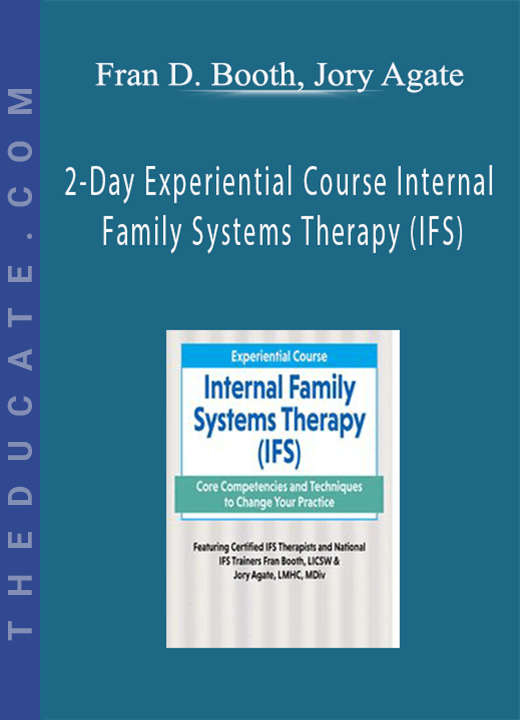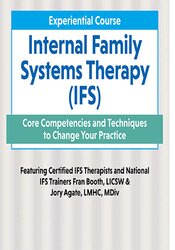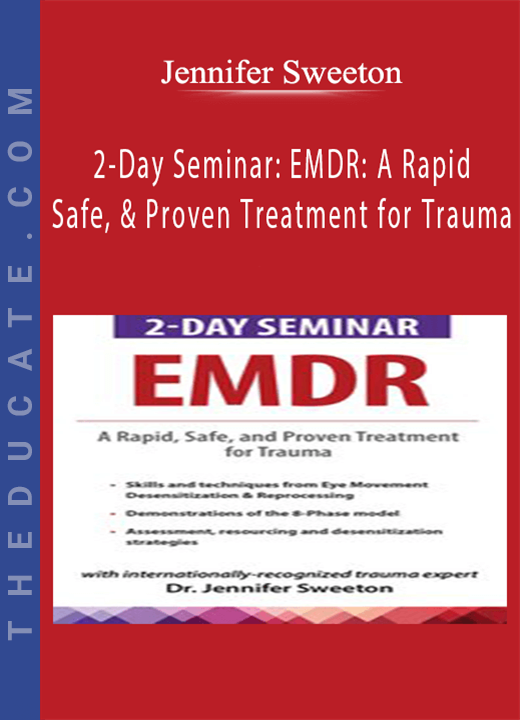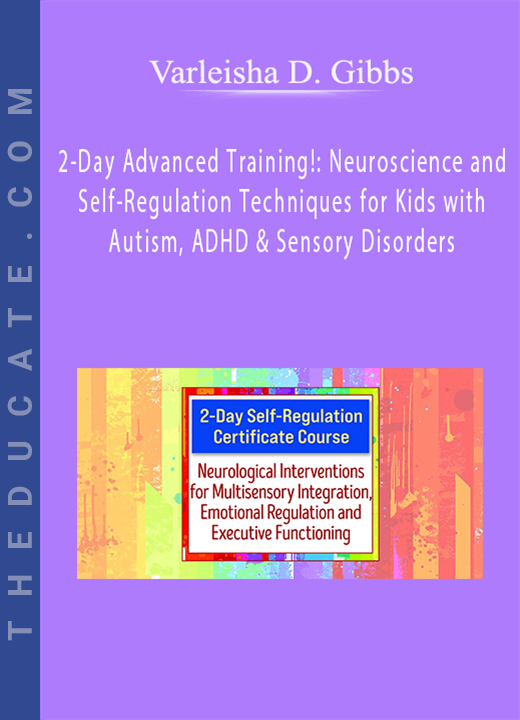Description
- Faculty:
- Fran D. Booth | Jory Agate
- Duration:
- 12 Hours 5 Minutes
- Format:
- Audio and Video
- Copyright:
- Sep 24, 2020
- Review the IFS treatment paradigm step-by-step
- Practice IFS strategies to solidify your learning
- Experience in-depth application of the model & learn solutions for clinical work with trauma, anxiety, depression, shame, relationships, problem behaviors, and more!
- Acquire skills that will make a difference in your practice
- Boost your confidence in understanding symptoms & ability to get to the “heart of the matter”
- Renew and restore hope for healing in you and for your clients
- Comprehensive, compassionate, non-pathologizing paradigm
- Evolution of the model by Richard C. Schwartz, Ph.D.
- Integration with various therapeutic modalities
- Shift perspective on “psychopathology”
- Understand the inner world of clients, Self and parts
- Facilitate access to inner wisdom and self-compassion
- Heighten internal strengths for healing
- Unburden and heal burdens
- Empirically validated treatment (Study limitations: small sample size, no control group)
- Risks: review clinical considerations
- Translate the presenting concern into part/parts
- Map the system of parts
- Identify protectors and exiles
- Know where to begin
- Differentiate the person from the symptom
- Access a state of compassion
- Help clients to become curious
- Connect with the target part
- Facilitate internal attachment work
- Learn the history and benevolent intention behind the symptom
- Establish a trusting relationship with proactive and reactive parts
- Understand the fears and address concerns of protective parts
- Discover the real story behind the symptom
- Resolve internal conflicts
- Gain permission to heal
- Inner attachment work for wounds
- Connect with the wounded part
- Witness the pain rather than relive it
- Allow compassion to flow
- Retrieve the wounded part from past
- Release feelings, thoughts, sensations, negative beliefs
- Invite additional inner resources
- Integrate systemic reorganization
- Solidify strengths/gains
- Flow of the model
- Goals of IFS therapy
- How to start an IFS session
- Recognize your therapist parts
- Understand the interaction of therapist parts with client parts
- Increase therapist self-compassion
- Redefine countertransference
- Shifted therapist role
- The IFS lens on anxiety & depression
- Allow parts a voice without overwhelm
- Mindfulness vs flooding
- Strategies to help anxious and/or depressed parts
- Techniques to work with the extreme symptoms
- Flashbacks and dissociation
- Roadblocks to healing trauma
- New strategies for suicidality and intense rage
- Understand and heal the family lineage trauma
- Identify the critic and/or part that shames
- Recognize part that experiences shame
- Implement different clinical approaches for these parts
- Appreciate the protective system that develops around shame
- Confidently address the shame system
- Think systemically, multiple systems
- Understand the parts cycle
- Ability to unbend from reactive parts and do a U-turn
- Listen to the part that other parts hate
- Listen to the part that hates that problem behavior
- Emotional eating & binge eating
- Addictions
- Lecture & practice
- Videos
- Live demonstrations
- Meditations
Fran D. Booth, Jory Agate – 2-Day Experiential Course Internal Family Systems Therapy (IFS): Core Competencies and Techniques to Change Your Practice
Description
Revolutionize your clinical approach and help your clients heal with the Internal Family Systems (IFS) therapy model.
Experience the dual benefits! IFS offers a deep, transformational healing to clients AND it allows clinicians the ability to connect with ANY client. Reduce therapist fatigue and discouragement.
Here’s why….
IFS founder, Richard Schwartz, Ph.D., has develop a non-pathologizing treatment with transformational results. Clients access inner resources to assist in healing. Therapists help clients connect with all their parts, especially the parts that hold pain and challenging emotions. The key to healing is to free each part from the suffering, trauma, abuse, and attachment injuries they carry.
Here is the next step to change how you approach your clients.
Over two days of specialized online training, you will…
Purchase today and leave feeling confident to start incorporating IFS into your clinical practice!!
Don’t miss this career changing opportunity.
Handouts
| Manual – 2-Day Experiential Course: Internal Family Systems Therapy (IFS) (28.9 MB) | 52 Pages | Available after Purchase |
Outline
Internal Family Systems (IFS)
IFS STEP-BY-STEP
Step 1: Identify, Understand, Connect
Step 2: Employ a Meditative Process, Mindfulness
Step 3: Work with Protective Parts
Step 4: Heal the Wound
Step 5: Integration
Synthesis and Application
IFS and the Therapist
CLINICAL APPLICATIONS OF IFS
Anxiety and Depression
Trauma
Shame
Relationship Issues
Problematic Behaviors Redefined
Experiential Training INCLUDES
Faculty

Fran D. Booth Related seminars and products: 1
Frances D. Booth, LICSW is a certified IFS therapist and trainer with over 40 years of direct clinical experience in a wide variety of settings. As a national and international IFS trainer, she collaborates with Dr. Richard Schwartz, founder of Internal Family Systems, to bring IFS and Self-leadership to diverse populations worldwide.
Fran’s clinical specialties are: trauma, anxiety, depression, cancer and medical concerns, eating disorders, and attachment disorders. She has successfully integrated IFS principles into her practice and she consults widely to clinicians on using IFS. She brings to this workshop a depth of experience for integrating IFS into practice. A dynamic, engaging speaker, Fran’s unique blend of theoretical understanding and clinical expertise will provide a solid IFS foundation.
Fran graduated from Cornell University and Simmons School for Social Work and has held faculty positions at Smith College School for Social Work, Tufts Medical School and William James College.
Jory Agate, LMHC, MDIV, MA Related seminars and products: 1
Jory Agate, LMHC, MDiv, MA, is both a certified IFS therapist and IFS assistant trainer.
Jory has been a student of IFS for over 10 years and has logged thousands of hours with a wide variety of patient populations. As an assistant trainer for the Center for Self Leadership (CSL), the IFS organization founded by IFS creator Richard Schwartz, PhD, Jory presents IFS workshops around the country and abroad. She maintains a long affiliation with CSL and their passion to educate mental health professionals worldwide.
She has successfully used IFS principles in a variety of cases and understands the real-world application of this effective treatment modality. As a speaker, Jory offers a unique blend of technical understanding of theory and clinical expertise, providing learners with comprehensive knowledge of the IFS approach.
Her private practice is located Cambridge, MA where she specializes in working with trauma, attachment, families, couples, sexuality and identity, and parenting. She received her counseling degree from Lesley University, Cambridge, MA. Previously, she had a 20-year career in Unitarian Universalist ministry.







4 reviews for Fran D. Booth, Jory Agate – 2-Day Experiential Course Internal Family Systems Therapy (IFS): Core Competencies and Techniques to Change Your Practice
There are no reviews yet.